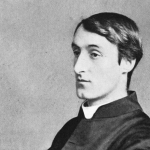The Turn
Brave infant of Saguntum, clear
Thy coming forth in that great year,
When the prodigious Hannibal did crown
His rage with razing your immortal town.
Thou, looking then about,
Ere thou wert half got out,
Wise child, didst hastily return,
And mad’st thy mother’s womb thine urn.
How summed a circle didst thou leave mankind
Of deepest lore, could we the center find!
The Counterturn
Did wiser nature draw thee back
From out the horror of that sack,
Where shame, faith, honor, and regard of right
Urged, hurried forth, and hurled
Upon th’ affrighted world;
Sword, fire, and famine, with fell fury met,
And all on utmost ruin set,
As, could they but life’s miseries foresee,
No doubt all infants would return like thee?
The Stand
For what is life, if measured by the space,
Not by the act?
Or maskèd man, if valued by his face
Above his fact?
Here’s one outlived his peers
And told forth fourscore years;
He vexèd time and busied the whole state,
Troubled both foes and friends;
But ever to no ends:
What did this stirrer but die late?
How well at twenty had he fall’n or stood!
For three of his fourscore he did no good.
The Turn
He entered well, by virtuous parts,
Got up and thrived with honest arts;
He purchased friends, and fame, and honors then,
And had his noble name advanced with men;
But weary of that flight
He stooped in all men’s sight
To sordid flatteries, acts of strife,
And sunk in that dead sea of life
So deep, as he did then death’s waters sup,
But that the cork of title buoyed him up.
The Counterturn
Alas, but Morison fell young;
He never fell, thou fall’st, my tongue.
He stood, a soldier to the last right end,
A perfect patriot, and a noble friend,
But most a virtuous son.
All offices were done
By him so ample, full, and round,
In weight, in measure, number, sound,
As, though his age imperfect might appear,
His life was of humanity the sphere.
The Stand
Go now, and tell out days summed up with fears,
And make them years;
Produce thy mass of miseries on the stage
To swell thin age;
Repeat of things a throng,
To show thou hast been long,
Not lived; for life doth her great actions spell
By what was done and wrought
In season, and so brought
To light: her measures are, how well
Each syllabe answered, and was formed how fair;
These make the lines of life, and that’s her air.
The Turn
It is not growing like a tree
In bulk doth make man better be;
Or standing long an oak, three hundred year,
To fall a log at last, dry, bald, and sere:
A lily of a day
Is fairer far in May;
Although it fall and die that night,
It was the plant and flower of light.
In small proportions we just beauties see,
And in short measures life may perfect be.
The Counterturn
Call, noble Lucius, then for wine,
And let thy looks with gladness shine;
Accept this garland, plant it on thy head,
And think, nay know, thy Morison’s not dead.
He leaped the present age,
Possessed with holy rage
To see that bright eternal day;
Of which we priests and poets say
Such truths as we expect for happy men,
And there he lives with memory, and Ben
The Stand
Jonson! who sung thus of him, ere he went
Himself to rest,
Or taste a part of that full joy he meant
To have expressed
In this bright asterism;
Where it were friendship’s schism
(Were not his Lucius long with us to tarry)
To separate these twi-
Lights, the Dioscuri,
And keep the one half from his Harry.
But fate doth so alternate the design,
Whilst that in heaven, this light on earth must shine.
The Turn
And shine as you exalted are,
Two names of friendship, but one star:
Of hearts the union. And those not by chance
Made, or indenture, or leased out t’advance
The profits for a time.
No pleasures vain did chime
Of rimes, or riots, at your feasts,
Orgies of drink, or feigned protests,
But simple love of greatness and of good;
That knits brave minds and manners more than blood.
The Counterturn
This made you first to know the why
You liked, then after to apply
That liking, and approach so one the tother,
Till either grew a portion of the other:
Each styled by his end
The copy of his friend.
You lived to be the great surnames
And titles by which all made claims
Unto the virtue. Nothing perfect done,
But as a Cary, or a Morison.
The Stand
And such a force the fair example had,
As they that saw
The good, and durst not practice it, were glad
That such a law
Was left yet to mankind;
Where they might read and find
Friendship, indeed, was written, not in words;
And with the heart, not pen,
Of two so early men,
Whose lines her rolls were, and recòrds,
Who, ere the first down bloomèd on the chin,
Had sowed these fruits, and got the harvest in.




















Comment form: